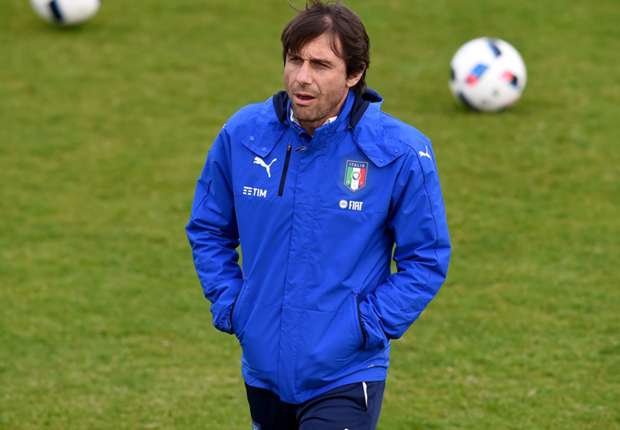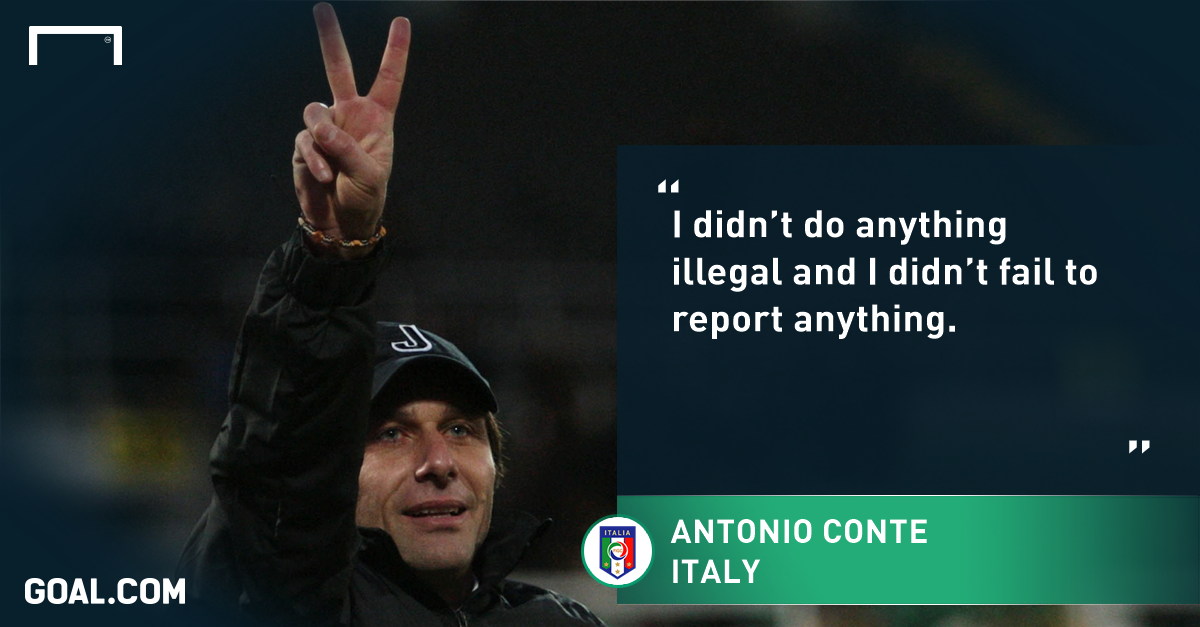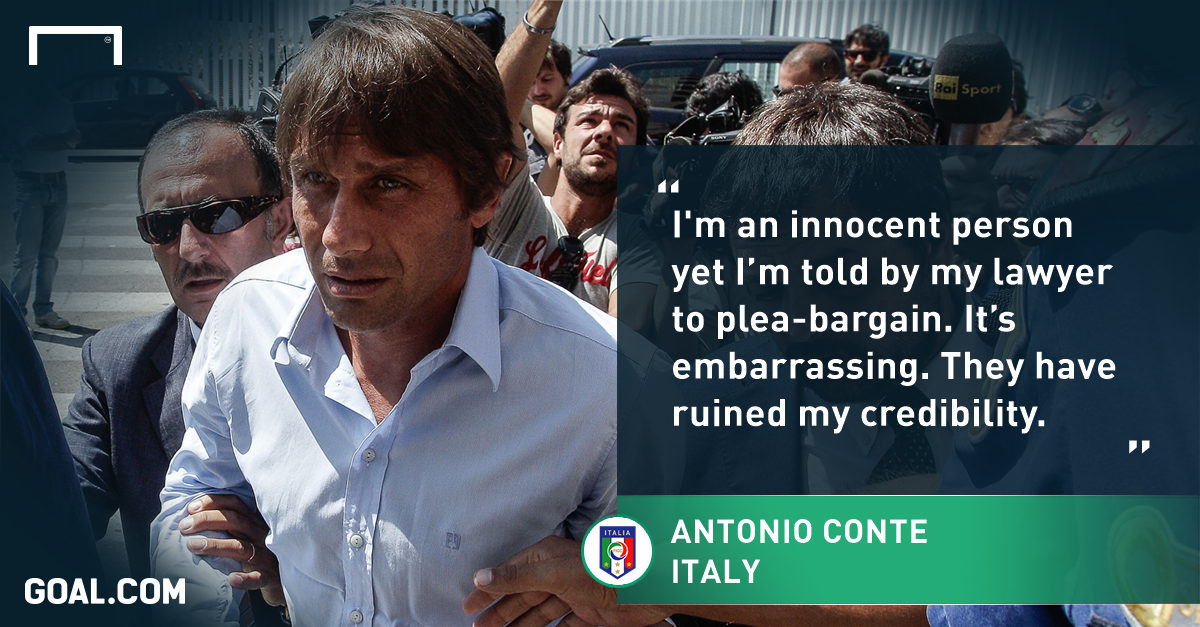- Joined
- Oct 8, 2015
- Messages
- 188
- Points
- 0
Cloud of corruption hangs over new Chelsea boss Conte

By Mark Doyle
Apr 4, 2016 14:00:00
The Italian coach is to go on trial in Cremona for sporting fraud, after being accused of failing to report an alleged attempt to fix a game during his time in charge of Siena
Former Perugia president Luciano Gaucci once infamously claimed, "Eighty per cent of the games in Italy are fixed." Rather depressingly, only the figure was questioned by the nation's disillusioned fans; nobody doubted that match-fixing was indeed widespread.
This, after all, is a nation in which Paolo Rossi had a three-year ban for his involvement in the Totonero betting scandal conveniently reduced by 12 months, thus allowing him to fire the Azzurri to World Cup glory in 1982.
The Calciopoli refereeing scandal of 2006, meanwhile, seemed to galvanise Italy's players ahead of their triumph at Germany 2006. And now, the coach of the national team, Antonio Conte, is set to stand trial for sporting fraud just over a month before leading his country into competition at Euro 2016.
It is important to note that Conte does not stand accused of match-fixing but rather knowing about attempts to do so and then failing to alert the authorities. In that sense, one could argue that much of the population could be on trial for sporting fraud given it is widely accepted that some matches - particularly towards the end of the season when mid-table sides no longer have anything left to play for - are fixed.

Indeed, Maurizio Montesi once asked: "And what is so new about all of this? That football is fake, corrupt? We knew that already, even if some people pretended that they didn't know, or didn't want to know because they have economic interests, or simply because they are fans."
The former Lazio midfielder posed those awkward questions after Totonero in 1980. 36 years on, they are as painfully relevant now as they were then - even more so following last weekend's shocking doping allegations involving Premier League footballers.
Carlo Gervasoni even explained in great detail last year that he found it quite easy to persuade fellow professionals to partake in the latest betting scandal to hit the Italian game.
"It’s complicated to give an exact number of the players I contacted for match-fixing because there’s still a trial ongoing, but I more or less managed to contact 60," the former Cremonese and Piacenza defender told Italia 1.
"Out of these 60, only two said no: one was Italian and one foreign. I realised it was more difficult to convince a foreign player to fix a game.
"The Italians made a problem out of it initially, but then once they had the cash in hand before the game, they found it easier."
Gervasoni is a key witness in the trial to which he is referring. It centres on a Cremona-based investigation into the 'Last Bet' scandal of 2011, which has 104 defendants, the most high-profile of whom is Conte. However, it is not Gervasoni who has implicated the Italy boss in this sordid affair but rather Filippo Carobbio.
Carobbio played under Conte during the former Juventus coach's time in charge of Siena. He alleged that plans were made to fix a game against Novara in April 2011 because Siena president Massimo Mezzaroma had placed a significant sum of money on a draw. The game finished 2-2.
Carobbio claims Conte was fully aware of the plot. "There was an agreement for the draw and, in fact, we speak about it during our technical meeting," he stated in 2012. "We were all aware of the agreed outcome, above all so that we could act accordingly during the game. The coach himself, Antonio Conte, told us that we could rest easy as we had reached an agreement with Novara."
The former Italy international was ultimately cleared of any wrongdoing in relation to the Novara fixture. However, Carobbio also alleged that Conte knew of a second attempt to arrange a result, against AlbinoLeffe towards the tail end of the same season.
According to Carobbio, in January 2011, Siena assistant coach Cristian Stellini instructed him and team-mate Claudio Terzi to get in contact with players from AlbinoLeffe to "make arrangements for the return game, so that the points would go to the side with the greater need." At the time, Siena had already secured promotion to Serie A, while their opponents were battling relegation.
AlbinoLeffe prevailed 1-0, although Carobbio claimed that not everybody at Siena wanted to roll over. "Some wanted to win, hoping to finish first and get the maximum bonus [for doing so]," he said. "However, in the end, we all agreed, the team and the coach, to give the win to AlbinoLeffe."
Conte has always maintained that he knew of no such illegal activity. However, he did agree to a plea-bargain put forward by the prosecutor, Stefano Palazzi, that would have seen him accept a three-month touchline ban but without having to issue any kind of admission of guilt.
This proposal was rejected by the Italian Football Federation (FIGC), much to Conte's shock. "I agree with the judges on one thing: 90 days wasn’t a suitable punishment - the right one is zero. Even if today I had the certainty of a three-month ban, my answer would have been 'no'. I didn’t do anything illegal and I didn’t fail to report anything."
Consequently, Conte thus rejected the prosecutor's offer to try to negotiate a second plea-bargain that the FIGC's Disciplinary Committee would accept. Moreover, he claimed that he had been coerced into accepting the original deal with Palazzi.

"I consider a plea-bargain blackmail," he fumed. "I'm an innocent person yet I’m told by my lawyer to plea-bargain. It’s embarrassing. They have ruined my credibility in the changing room. Those people who know me know what type of person Antonio Conte is...
“Now I’m afraid to argue with one of my own players. If I send one of my players into the stands then this type of thing can happen. They believe the word of someone who has been selling games for three-and-a-half years!"
Carobbio's credibility has been repeatedly questioned, while it was also pointed out that not one other Siena player implicated Conte in the fix. It has simply been a case of one man's word against the other and, given Conte was tried in a process that considers a defendant guilty until proven innocent, it was perhaps unsurprising that he was not only banned for 10 months but that this ruling was upheld by the Italian Federal Court.
However, the sentence infuriated both Conte and his then employers Juventus, as the charge relating to the Novara game had been dropped by that point, after it had been disproven that he had made up an injury to striker Salvatore Mastronunzio in order to justify his exclusion from the starting line-up.
Conte thus appealed once more and his ban was eventually reduced to four months by the National Court for Sports Arbitration (TNAS). He was thus unable to sit on the bench for most of the first half of the 2012-13 season.
Conte remained indignant, continuing to protest his innocence, but the prosecutors argued that he could not have known that his assistant coach, Stellini - who was eventually suspended for two-and-a-half years - had agreed to fix the AlbinoLeffe encounter. Palazzi also defended Carobbio's motives for implicating his ex-boss: "He would have got the same penalty even if he had not mentioned Conte's name. So there was no element of personal animosity. Instead, we have shown that there is consistency in the player's statements."
It was for that reason that the suspicion of wrongdoing never truly went away and also why Conte is now facing a charge of sporting fraud.
The trial gets under way this week and is expected to be finished in mid-May, with the authorities having agreed to fast-track the process in order to allow Conte to learn his fate before the Euros. Furthermore, it is believed that even if Conte is found guilty, he will face nothing more than a fine, leaving him free to completely concentrate on Italy's preparations for France and then his new job at Chelsea.
One of Conte's lawyers, Leonardo Cammarata, has admitted that a guilty verdict would "seriously damage" his client's image. However, it certainly wouldn't affect his job prospects. Sadly, that is the only thing that has been proven beyond all doubt thus far.



